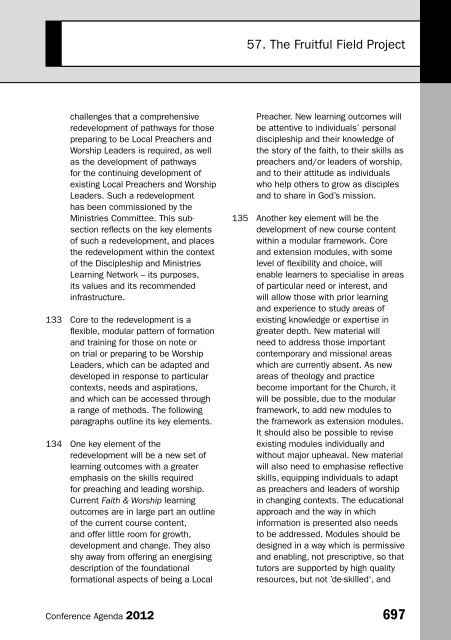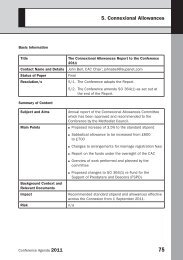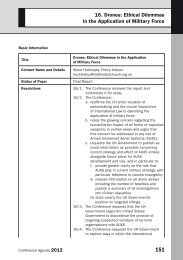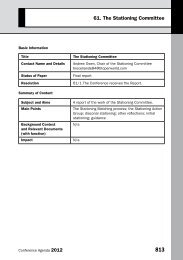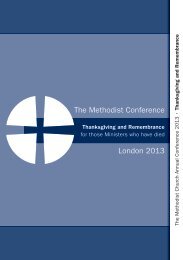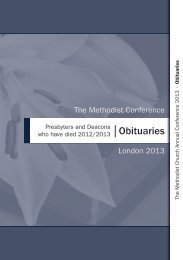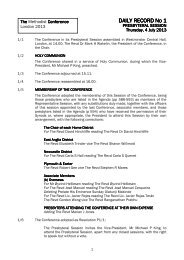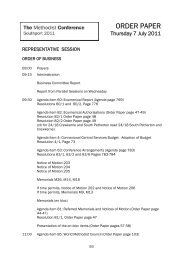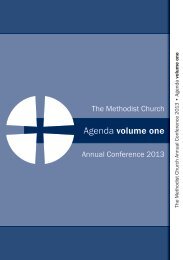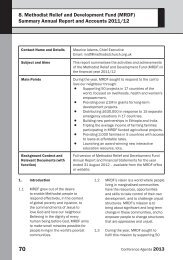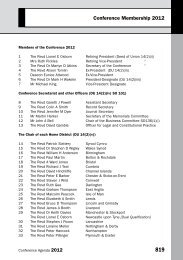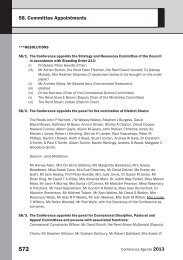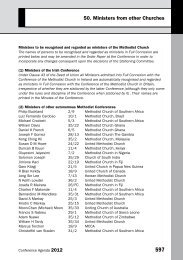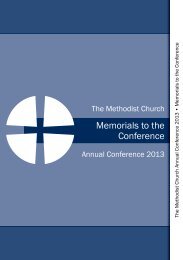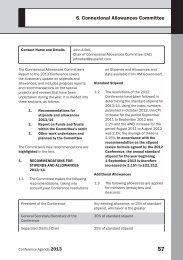Agenda Volume 3 - Methodist Conference
Agenda Volume 3 - Methodist Conference
Agenda Volume 3 - Methodist Conference
You also want an ePaper? Increase the reach of your titles
YUMPU automatically turns print PDFs into web optimized ePapers that Google loves.
57. The Fruitful Field Project<br />
challenges that a comprehensive<br />
redevelopment of pathways for those<br />
preparing to be Local Preachers and<br />
Worship Leaders is required, as well<br />
as the development of pathways<br />
for the continuing development of<br />
existing Local Preachers and Worship<br />
Leaders. Such a redevelopment<br />
has been commissioned by the<br />
Ministries Committee. This subsection<br />
reflects on the key elements<br />
of such a redevelopment, and places<br />
the redevelopment within the context<br />
of the Discipleship and Ministries<br />
Learning Network – its purposes,<br />
its values and its recommended<br />
infrastructure.<br />
133 Core to the redevelopment is a<br />
flexible, modular pattern of formation<br />
and training for those on note or<br />
on trial or preparing to be Worship<br />
Leaders, which can be adapted and<br />
developed in response to particular<br />
contexts, needs and aspirations,<br />
and which can be accessed through<br />
a range of methods. The following<br />
paragraphs outline its key elements.<br />
134 One key element of the<br />
redevelopment will be a new set of<br />
learning outcomes with a greater<br />
emphasis on the skills required<br />
for preaching and leading worship.<br />
Current Faith & Worship learning<br />
outcomes are in large part an outline<br />
of the current course content,<br />
and offer little room for growth,<br />
development and change. They also<br />
shy away from offering an energising<br />
description of the foundational<br />
formational aspects of being a Local<br />
Preacher. New learning outcomes will<br />
be attentive to individuals’ personal<br />
discipleship and their knowledge of<br />
the story of the faith, to their skills as<br />
preachers and/or leaders of worship,<br />
and to their attitude as individuals<br />
who help others to grow as disciples<br />
and to share in God’s mission.<br />
135 Another key element will be the<br />
development of new course content<br />
within a modular framework. Core<br />
and extension modules, with some<br />
level of flexibility and choice, will<br />
enable learners to specialise in areas<br />
of particular need or interest, and<br />
will allow those with prior learning<br />
and experience to study areas of<br />
existing knowledge or expertise in<br />
greater depth. New material will<br />
need to address those important<br />
contemporary and missional areas<br />
which are currently absent. As new<br />
areas of theology and practice<br />
become important for the Church, it<br />
will be possible, due to the modular<br />
framework, to add new modules to<br />
the framework as extension modules.<br />
It should also be possible to revise<br />
existing modules individually and<br />
without major upheaval. New material<br />
will also need to emphasise reflective<br />
skills, equipping individuals to adapt<br />
as preachers and leaders of worship<br />
in changing contexts. The educational<br />
approach and the way in which<br />
information is presented also needs<br />
to be addressed. Modules should be<br />
designed in a way which is permissive<br />
and enabling, not prescriptive, so that<br />
tutors are supported by high quality<br />
resources, but not ’de-skilled‘, and<br />
<strong>Conference</strong> <strong>Agenda</strong> 2012 697


